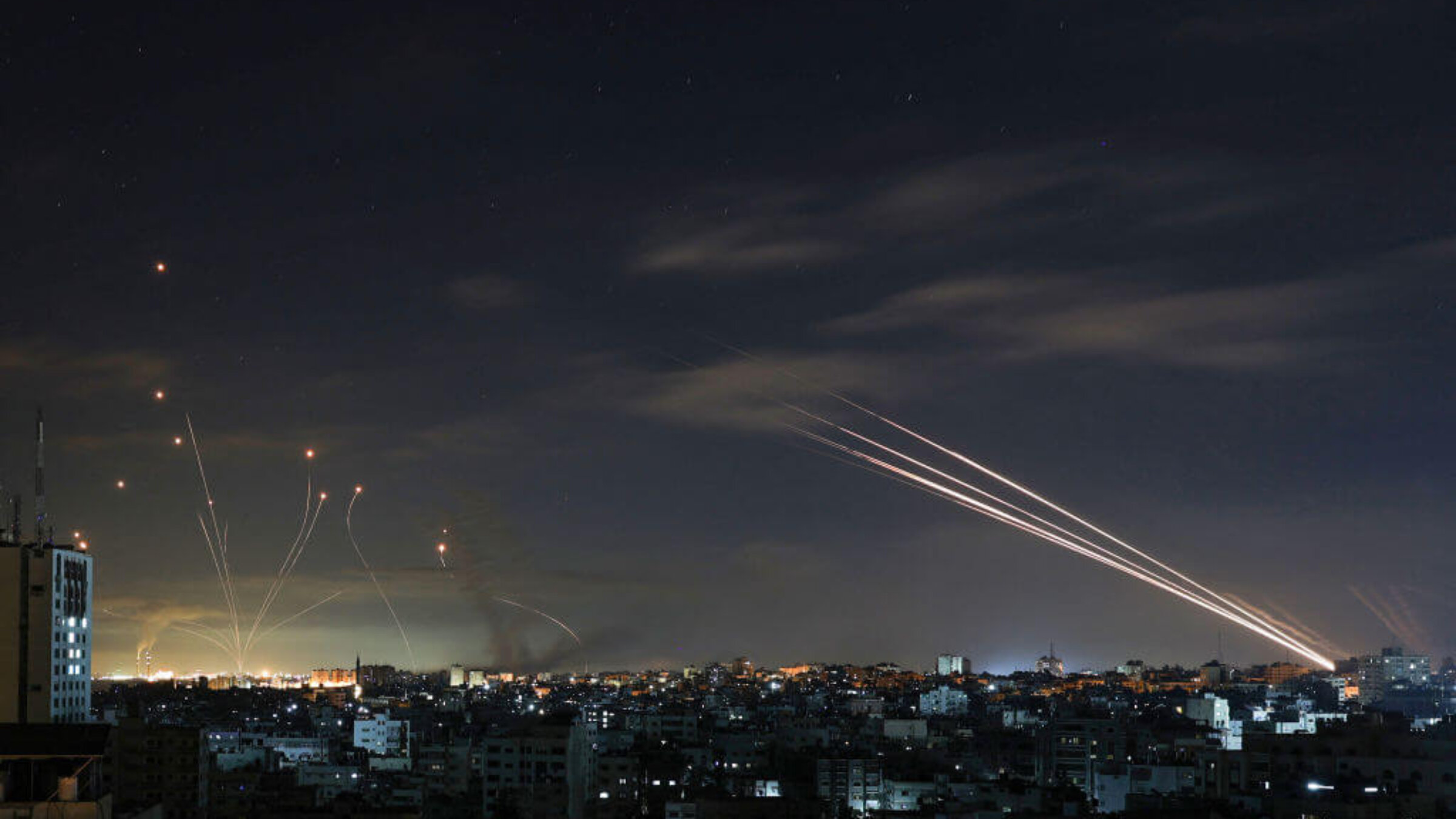Without serious talks, violence between Israel and Gaza will continue
Israel’s recent success in Gaza is a fleeting one

Israel’s Iron Dome missile defense system intercepts rockets fired by the Hamas movement from Gaza city towards Israel early on May 16, 2021. Photo by Mohammed Abed/AFP via Getty Images
An old joke about Argentina could easily apply to Israel as well: If you leave and come back two weeks later, you’ll find that everything is different. But if you come back after two years, you’ll find that everything is the same.
This is, sadly, particularly true when it comes to the recurrent conflict between Israel and the terrorist groups in Gaza.
Israel has just wrapped up operation “Breaking Dawn” after achieving a cease-fire deal with the Gaza-based terrorist organization Palestinian Islamic Jihad. Any honest analysis of what was achieved wouldn’t be very different from the analysis performed in the aftermath of the operation before that, and the one before that, and even the one before that, too.
The operation dealt a severe blow to the Palestinian Islamic Jihad (in previous iterations, Hamas). In this round, the Israel Defense Forces hit 170 Islamic Jihad targets and eliminated 12 of the leaders and members, including Taysir al-Jabari, the commander for the northern region of Gaza, and Khaled Mansour, the southern region commander.
What made this different
But in all fairness, there are aspects of this operation that were different. It was short, lasting less than 72 hours until a cease-fire was agreed upon, which ended the operation as well as the rocket-firing from Gaza into Israel. The scope of the operation was well-defined, and Hamas — the powerful terrorist group that governs Gaza — did not take part in it (if they had, the cycle of violence would probably have continued and escalated, as it has in previous occasions).
Israel also demonstrated the incredible effectiveness of the Iron Dome system, a missile defense system first funded by the Obama administration that has received continued support by the U.S. With this technology, Israel reported it was able to intercept about 97% of the rockets going into populated areas launched by the terrorists in Gaza. Israel was also able to avoid severe criticism in the international arena, potentially due to the short nature of the operation.
This is all good news for Israel. And with another round of elections scheduled for Nov. 1, it was also good for Prime Minister Yair Lapid, who for the first time confronted a live conflict sitting as head of the government.
No long-term strategy
But we cannot ignore the civilian causalities on the Palestinian side, including 15 children. Whether or not these deaths were Israel’s fault, they are certainly Israel’s shared responsibility. Despite the overall success of the operation, and previous operations in Gaza, these recurrent wins have proven to be nothing more than ephemeral.
As long as Israel has no long-term strategy to deal with the dire situation in Gaza, or with the Palestinians more generally, we will continue to see periodic fighting. And as long as there is no broader strategy, the fighting will never stop, putting the lives of both innocent Israelis and Palestinians at risk.
Whether we like to hear it or not, there is no military solution to the situation in Gaza. The only solution will be a comprehensive deal with the Palestinians.
Unfortunately, until then, targeted terrorists will be replaced, destroyed rocket stocks will be replenished, tunnels will be re-dug, and terror infrastructure within Gaza will be rebuilt.
I’m not naïve. I know the chance of serious diplomatic talks between Israelis and Palestinians, let alone a comprehensive solution, anytime soon is essentially zero. But I ask you not to be naïve either. No operation in Gaza, no matter how successful we label it to be, will lead Hamas and other terrorist organizations to change tactics, let alone disappear.
That is the truth, and ignoring it is simply a disservice to ourselves.
To contact the author, email [email protected].
A message from our Publisher & CEO Rachel Fishman Feddersen

I hope you appreciated this article. Before you go, I’d like to ask you to please support the Forward’s award-winning, nonprofit journalism so that we can be prepared for whatever news 2025 brings.
At a time when other newsrooms are closing or cutting back, the Forward has removed its paywall and invested additional resources to report on the ground from Israel and around the U.S. on the impact of the war, rising antisemitism and polarized discourse.
Readers like you make it all possible. Support our work by becoming a Forward Member and connect with our journalism and your community.
— Rachel Fishman Feddersen, Publisher and CEO






























